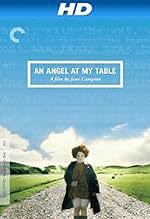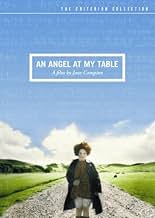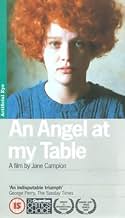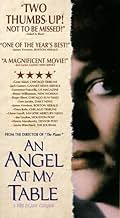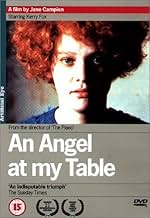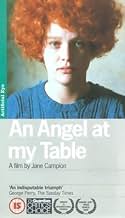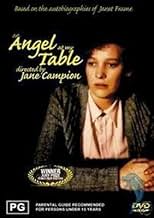NOTE IMDb
7,4/10
8,9 k
MA NOTE
Janet Frame est une enfant brillante jusqu'à ce que, à l'adolescence, elle soit diagnostiquée à tort schizophrène. Explorez la découverte du monde par Janet et sa vie en Europe où ses livres... Tout lireJanet Frame est une enfant brillante jusqu'à ce que, à l'adolescence, elle soit diagnostiquée à tort schizophrène. Explorez la découverte du monde par Janet et sa vie en Europe où ses livres sont publiés avec succès.Janet Frame est une enfant brillante jusqu'à ce que, à l'adolescence, elle soit diagnostiquée à tort schizophrène. Explorez la découverte du monde par Janet et sa vie en Europe où ses livres sont publiés avec succès.
- Récompenses
- 19 victoires et 5 nominations au total
Kevin J. Wilson
- Father
- (as K.J. Wilson)
Histoire
Le saviez-vous
- GaffesThe streets of Ibiza have some features that surely were not present on the 50s, i.e., a "no parking" signal on one of the streets. Cars were very rare on the island those days.
- Bandes originalesSomebody Stole My Gal
Written by Leo Wood
Performed by Pat McMinn with Crombie Murdoch and the Nickelodeons
Used by permission of D.F. Peach
Commentaire à la une
An Angel at My Table tells the story of famed New Zealand author Janet Frame. We are drawn into the quiet world of the shy, red-haired girl who struggles with her life, but succeeds through her exceptional talent of writing. Since her autobiography was written in three separate volumes, we are treated to a film in three separate parts, beginning with her journey through childhood. The film does an excellent job at portraying the character of Frame, and her nervous attitude when brought into social situations. Every ounce of shyness is felt off-screen, which is a kudos to the direction of Campion, that plays an important part in making sure that this woman is brought to life, as realistic, and as close to the truth as possible.
Growing up in poverty, with two hard-working parents, and 4 siblings, life must've been hard. But when you're thrust into such a difficult situation, it somehow seems normal and it doesn't bother that it's a much harder life than other people currently living are. But Janet lived through her childhood, finding that she would love to spend her life as a poet, or just writing. A depression hit her hard during her teenage years when an unexpected tragedy occurred, and she had chosen to write, instead of being with that person beforehand. Not knowing she was a depressed young person, Frame was sent to a mental hospital, and forced to undergo several shock treatments, under the incorrect diagnosis of schizophrenia. However, Frame persevered through it, using writing as a way of expressing her own thoughts. While still in the mental hospital, she was able to publish a book. The years inside the hospital are the most unpleasant of film, and Campion perfectly captures the deranged conditions that Janet experienced. The most remarkable part about the direction is how it doesn't go over the top to deliver a nauseating film in those scenes. Rather, she plays to the quiet personality of Frame. The film is kept with the same pace, and focused in a way that never wants to show itself off, but keeps the main character always in the center, without losing that focus.
The blown-up biopic `Malcolm X' was released around a year later, and while I admire that film, it was also very hyped-up before it's release. I found a strange drawing power in the fact that Jane Campion's film wasn't about spectacle, but about someone's life that is done more sincerely, and realistically, paying close attention to details, both period and human. Something you wouldn't find in a Hollywood biopic, such as Milos Foreman's `Man on the Moon,' which I openly despise.
The writer and director surprised me a bit concerning a small detail in the film. In films concerning `writing', and an exceptional author (Wonder Boys, Finding Forrester), there is never any real proof of how good the writer supposedly is. We are never allowed to read the great book they wrote, nor are there much of any excerpts written to prove to us that the writer is indeed as great as it is suggested. In films, I realize that it really isn't possible to show such a thing, since film is a visual medium instead of a literary one. Campion and the screenwriter know this, and without subjecting us to Frame's writing, she adds in some narration, using actress Kerry Fox's voice. The narration is spread out in small bits throughout the film, never taking control of telling the story. Instead, it conveys the thoughts going on in Frame's mind, which are all little excerpts from the writing contained in her autobiographies. It begins with narration and ends with it. A surprising detail that is small, but adds much to the overall film, and gives the ending a sweet, and optimistic touch to an amazing film.
Frame was (is) talented at what she did most of the time, without knowing the talent was there. She only knew that she loved to do it, and wanted to continue doing it for the rest of her life. That is true talent. She had it, even at times when she thought there wasn't any hope; she had the ability to write. And because of that ability, that talent, she was able to gradually come to terms, and live comfortably with her life. ****1/2 of five or (9/10)
Growing up in poverty, with two hard-working parents, and 4 siblings, life must've been hard. But when you're thrust into such a difficult situation, it somehow seems normal and it doesn't bother that it's a much harder life than other people currently living are. But Janet lived through her childhood, finding that she would love to spend her life as a poet, or just writing. A depression hit her hard during her teenage years when an unexpected tragedy occurred, and she had chosen to write, instead of being with that person beforehand. Not knowing she was a depressed young person, Frame was sent to a mental hospital, and forced to undergo several shock treatments, under the incorrect diagnosis of schizophrenia. However, Frame persevered through it, using writing as a way of expressing her own thoughts. While still in the mental hospital, she was able to publish a book. The years inside the hospital are the most unpleasant of film, and Campion perfectly captures the deranged conditions that Janet experienced. The most remarkable part about the direction is how it doesn't go over the top to deliver a nauseating film in those scenes. Rather, she plays to the quiet personality of Frame. The film is kept with the same pace, and focused in a way that never wants to show itself off, but keeps the main character always in the center, without losing that focus.
The blown-up biopic `Malcolm X' was released around a year later, and while I admire that film, it was also very hyped-up before it's release. I found a strange drawing power in the fact that Jane Campion's film wasn't about spectacle, but about someone's life that is done more sincerely, and realistically, paying close attention to details, both period and human. Something you wouldn't find in a Hollywood biopic, such as Milos Foreman's `Man on the Moon,' which I openly despise.
The writer and director surprised me a bit concerning a small detail in the film. In films concerning `writing', and an exceptional author (Wonder Boys, Finding Forrester), there is never any real proof of how good the writer supposedly is. We are never allowed to read the great book they wrote, nor are there much of any excerpts written to prove to us that the writer is indeed as great as it is suggested. In films, I realize that it really isn't possible to show such a thing, since film is a visual medium instead of a literary one. Campion and the screenwriter know this, and without subjecting us to Frame's writing, she adds in some narration, using actress Kerry Fox's voice. The narration is spread out in small bits throughout the film, never taking control of telling the story. Instead, it conveys the thoughts going on in Frame's mind, which are all little excerpts from the writing contained in her autobiographies. It begins with narration and ends with it. A surprising detail that is small, but adds much to the overall film, and gives the ending a sweet, and optimistic touch to an amazing film.
Frame was (is) talented at what she did most of the time, without knowing the talent was there. She only knew that she loved to do it, and wanted to continue doing it for the rest of her life. That is true talent. She had it, even at times when she thought there wasn't any hope; she had the ability to write. And because of that ability, that talent, she was able to gradually come to terms, and live comfortably with her life. ****1/2 of five or (9/10)
Meilleurs choix
Connectez-vous pour évaluer et suivre la liste de favoris afin de recevoir des recommandations personnalisées
- How long is An Angel at My Table?Alimenté par Alexa
Détails
- Date de sortie
- Pays d’origine
- Langues
- Aussi connu sous le nom de
- An Angel at My Table
- Lieux de tournage
- Sociétés de production
- Voir plus de crédits d'entreprise sur IMDbPro
Box-office
- Montant brut aux États-Unis et au Canada
- 1 054 638 $US
- Week-end de sortie aux États-Unis et au Canada
- 12 905 $US
- 27 mai 1991
- Montant brut mondial
- 1 055 995 $US
- Durée2 heures 38 minutes
- Couleur
- Rapport de forme
- 1.66 : 1
Contribuer à cette page
Suggérer une modification ou ajouter du contenu manquant

Lacune principale
By what name was Un ange à ma table (1990) officially released in India in Hindi?
Répondre

